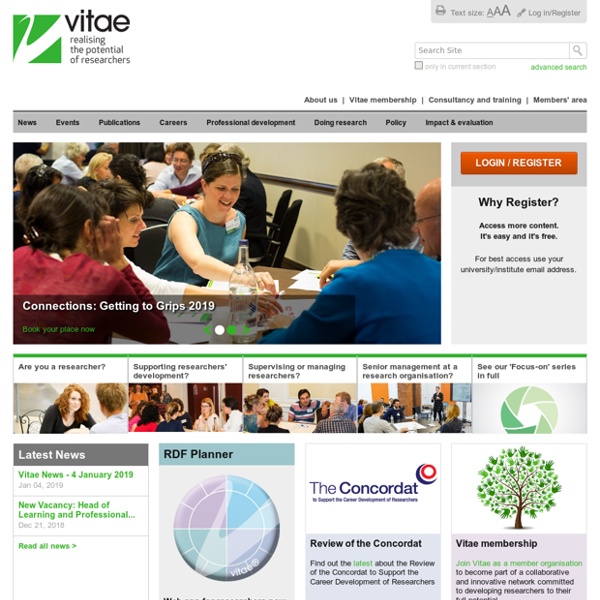



University of Bolton Primary research methodologies can generally be categorised into quantitative or qualitative techniques, although sometimes a combined approach is used. It is important that you understand the difference between them, the advantages and disadvantages and when they would be appropriate to use. Whichever methods you select, you must justify your choice and explain how this relates to the literature that you have discussed in the literature review. For example, you may choose a similar technique used in related studies on the basis that it has already been used successfully and you can easily compare findings; conversely, if research on particular topic has been carried out using qualitative methods only, you may consider this a weakness or a gap in the research and put forward a case for a quantitative study. You may be asked to discuss your research philosophy (epistemology).
Resources There is certainly no shortage of internet resources to help you in your career planning. We've tried to present here a range of resources that we've found useful in whole or in part - but of course we can't vouch for everything! Remember, too, that good old fashioned printed resources are well worth consulting: why not visit the careers service offices in Livingstone Tower. Academic careers These resources are listed in alphabetical order and cover post-doc opportunities as well as general academic vacancies in the UK, Europe and worldwide. Post-doc specific sites can be found in the following section. Further Study - Choosing your Career - Students - Careers Service Some useful resources For the vast majority of postgraduate courses and research programmes there is no centralised application system; you simply apply direct to the institution concerned. In most cases, there will be no fixed closing date, but you need to check this with the institution. Generally speaking, it is advisable to apply nine to twelve months before the intended starting date, especially as this may improve your chances of obtaining funding. Postgraduate courses | Postgrad.com These databases lists courses and research opportunities by subject area and also include information on funding sources
Doctoral Loan & Studentships You can get funding for postgraduate study through loans, studentships, bursaries and grants - you might also get help from your employer. Postgraduate Master’s Loan If you’re starting a master’s degree, you could get a Postgraduate Master’s Loan of up to £10,609 to help with course fees and living costs. Postgraduate Doctoral Loan Energy of Turkey - Turkish Energy statistics Definitions Crude oil > Exports: This entry is the total amount of crude oil exported, in barrels per day (bbl/day). Crude oil > Imports: This entry is the total amount of crude oil imported, in barrels per day (bbl/day). Crude oil > Production: This entry is the total amount of crude oil produced, in barrels per day (bbl/day).
Seminar Slides and Audio - Centre for Statistical Methodology Centre for Statistical Methodology Seminar Analysis of Clinical Trials Theme 30 June 2017Design and analysis of randomised trials with treatment-related clustering Rebecca Walwyn (University of Leeds)Slides (.pdf, 0.4MB) Slides & audio coming soon Centre for Statistical Methodology Seminar Multivariate Methods Theme 20 June 2017 Correspondence analysis for studying food perception in Europe Prof Eric Beh (University of Newcastle, Australia)Slides & audio (external website) Centre for Statistical Methodology Seminar 26 May 2017Information anchored sensitivity analysis for randomised controlled trials via Multiple Imputation Suzie Cro (Imperial College London)Slides (.pdf, 1.0MB)Slides & audio (external website) Centre for Statistical Methodology Seminar 28 April 2017 Statistical approaches to antibody data analysis for populations on the path of malaria elimination Nuno Sepulveda (LSHTM)Slides (.pdf, 6.3MB)Slides & audio (external website)
Jobs - EURAXESS Postdoc Position in Health Economics The recently established international, transdisciplinary Ludwig Boltzmann Institute Applied Diagnostics (LBI AD) in Vienna, Austria, focuses on the development and application of non-invasive dual diagnostic methods (combining molecular epigenetic and [...] 19.34 Country: Austria Organisation: Ludwig Boltzmann Institute Research field: Economics assistant Assistant in the scientific area of Natural Sciences, scientific field Chemistry, on a full time, temporary contract (replacement). Home page of E-Futures Doctoral Training Centre for Interdisciplinary Energy Research E-Futures is a Doctoral Training Centre that will train a new generation of scientists and engineers to address the challenges inherent in making the transition to a sustainable energy future. Students will receive an overview of energy issues in the first year of their training before developing individual specialisations through research projects. E-Futures draws together world-class research within the University of Sheffield to train engineers and scientists with the skills, knowledge and confidence to tackle today's evolving issues regarding energy generation, management and supply. E-Futures also represents a new working culture, fostering relationships between teams in universities and forging lasting links with industry and other external organisations. Students will receive a formal programme of taught material to develop and enhance their technical interdisciplinary knowledge, and broaden their set of skills.